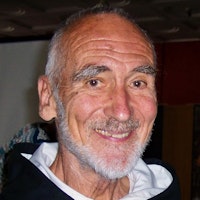When you are grateful, you know that you belong to a network of give-and-take and you say ‘yes’ to that belonging. This ‘yes’ is the essence of love.
David Steindl-Rast

When You Are Grateful
Topic: Gratitude
You can feel either grateful or alienated, but never both at the same time. Gratefulness drives out alienation; there is not room for both in the same heart. When you are grateful you know that you belong to a network of give-and-take and you say “yes” to that belonging. This “yes” is the essence of love. You need no words to express it; a smile will do to put your “yes” into action. Don’t let it matter to you whether or not the other one smiles back. Give someone an unexpected smile today and so contribute your share to peace on earth.
Brother David Steindl-Rast, O.S.B., was born Franz Kuno Steindl-Rast on July 12, 1926, in Vienna, Austria. Raised in a Catholic family during a time of political unrest, he endured the hardships of World War II, including conscription into the German army, though he did not see combat. He earned a master’s degree from the Vienna Academy of Fine Arts and a PhD in experimental psychology from the University of Vienna in 1952. That same year, he emigrated to the United States and entered Mount Saviour Monastery in Pine City, New York, becoming a Benedictine monk in 1953.
With his abbot’s permission, David Steindl-Rast began interreligious dialogue in the 1960s and studied Zen Buddhism with teachers such as Haku’un Yasutani and Shunryu Suzuki. In 1968, he co-founded the Center for Spiritual Studies alongside leaders from several religious traditions. His writing and teaching explore the relationship between mysticism, science, and spiritual practice. Among his published works are Gratefulness, the Heart of Prayer, Belonging to the Universe (with physicist Fritjof Capra), and The Music of Silence. He spent extended periods in monastic communities and in solitude at the New Camaldoli Hermitage in Big Sur, California.
Gratitude has remained central to David Steindl-Rast’s teaching, which he describes as a way of recognizing our shared life and cultivating peace. In 2000, he co-founded A Network for Grateful Living to support this vision. His TED talk on gratefulness has reached a wide audience, and his message continues to resonate through interviews and dialogue with spiritual and cultural leaders. He emphasizes that religious forms must remain alive by reconnecting with their inner vitality, encouraging a return to what he calls “the fire that’s within.” Now in his late nineties, his life continues to reflect a sustained inquiry into gratitude, belonging, and interfaith understanding.
Steindl-Rast, Br. David. "Five Small Gestures of Gratitude to Counteract Fear and Violence." Grateful.org, 2002, www.grateful.org/article/five-small-gestures-gratitude-counteract-fear-violence/.

David Steindl-Rast
Theme: Gratefulness

About This Br. David Steindl-Rast Quotation [Commentary]
David Steindl-Rast draws a clear link between gratefulness and love by rooting both in our shared belonging. “When you are grateful, you know that you belong to a network of give-and-take and you say ‘yes’ to that belonging. This ‘yes’ is the essence of love.” Gratitude, in his view, is not just a feeling but a recognition of mutual relationship. It is an inner response to being part of a larger exchange—one that connects us with others in ways both visible and unseen. The “yes” of gratitude is not abstract; it is an act of affirmation that becomes the heart of love.
In the surrounding passage, David Steindl-Rast makes the point that “you can feel either grateful or alienated, but never both at the same time.” Gratefulness, he says, “drives out alienation,” and leaves no space for separation in the same heart. This dynamic points to a deeper view of gratitude as a shift in perception. To be grateful is to recognize that we are not alone, that we are already embedded in a web of interdependence. The “network of give-and-take” is not something we build—it is something we awaken to. A simple gesture, like a smile, can give form to this recognition. “You need no words to express it,” he writes.
Br. David Steindl-Rast’s invitation is simple and active: “Give someone an unexpected smile today and so contribute your share to peace on earth.” The love expressed through gratitude does not require acknowledgment or reciprocity. “Don’t let it matter to you whether or not the other one smiles back.” By saying “yes” to belonging, we participate in the movement of love that underlies our shared life. Gratitude, in this light, is not only a private virtue but a way of showing up for the world.
An Additional David Steindl-Rast Quote
“Love is the unconditional “yes” of the heart. Or better still, as E.E. Cummings put it, “What yes is to if, love is to yes.” The “yes” of love is all-embracing. If we said “yes” to the journey without saying “yes” to the home, our courage might deteriorate into faithless recklessness. But if we said “yes” to the home only, not also to the journey, our faithfulness might shrivel into narrow timidity. Only the all-embracing “yes” of love closes the arc between the poles of the heart, thus welding together faithfulness and courage. We learn to say the “yes” of faithfulness by being faithful, and the “yes” of courage by overcoming our fears one by one. It takes a lifetime and death is the final test. To say “yes” with one’s whole heart, that is spiritual practice according to biblical tradition—at least this is one way of putting it.”
―Br. David Steindl-Rast. “About the Heart.” Grateful.org, 2002, www.grateful.org/article/about-heart/.
Resources
Related Quotes
Copyright © 2017 – 2025 LuminaryQuotes.com About Us